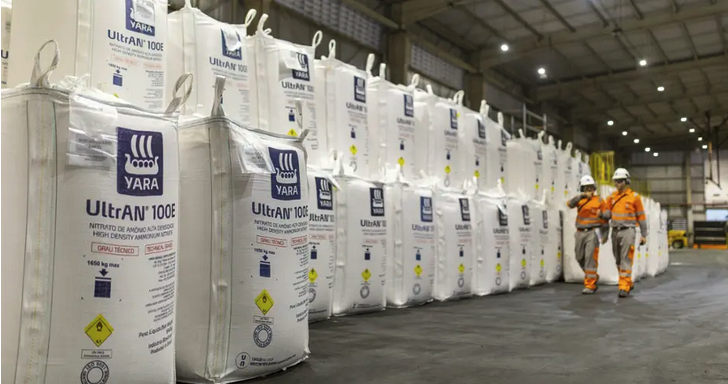Yara International ASA (Oslo, Norway) announced that it is has become the first in Brazil to produce ammonia made from renewable biomethane and has already delivered the first tons of lower-carbon product to its customers. A purified biogas made from sugarcane waste, biomethane is seamlessly replacing fossil natural gas for ammonia production, reducing greenhouse gas emissions by up to 75%.

Yara has begun delivering low-carbon ammonia products to its customers in Brazil (Source: Yara)
This achievement demonstrates Yara’s commitment to decarbonizing the food and industrial value chains as the company progresses toward carbon neutrality by 2050.
“This is a significant step in building renewable-based value chains across sectors and industries, from food and mining to on-and off-shore transport,” says Marcelo Altieri, President of Yara Brazil. “For agribusiness the impact is huge. By integrating this new generation of lower carbon fertilizers into our agronomic expertise, we offer farmers greater value while unlocking new markets and revenue streams. In coffee farming alone, we anticipate a reduction of up to 40% in the carbon footprint of harvested beans,” he adds.
Yara’s Industrial Complex in Cubatão, the largest consumer of natural gas in São Paulo and Brazil’s leading ammonia producer, is now fully equipped to operate with biomethane.
“Cubatão is now positioned to lead Brazil’s energy transition,” says Daniel Hubner, Senior Vice President at Yara Industrial Solutions. “By leveraging biomethane, Brazil can transform its vast organic waste into a valuable resource, accelerating the transition to a fair, efficient, and sustainable energy model.”
Hubner also highlights the importance of collaboration: “Brazil has the potential to be a global leader. To realize this, we must scale renewable solutions, create incentives, and foster public-private partnership to make these innovations accessible and impactful.”
Looking ahead, Yara plans to expand its portfolio to include products utilizing carbon capture and storage (CCS). This initiative underscores Yara’s leadership in driving industrial decarbonization and supporting sustainable growth in Brazil and on the global stage.
As the company approaches its 120th anniversary next year, its enduring mission to feed the world and protect the planet continues to guide its strategy and innovations.